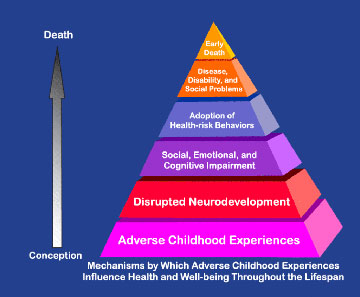March 30, 2015 is National Doctor’s Day. This is a day to honor doctors who have dedicated their lives to helping other human beings live longer, healthier lives. Whether the doctors are involved in research or specialists or general practitioners, these doctors have made a huge sacrifice for our well-being.
With this in mind, recently, many doctors are starting to acknowledge that the ACE study is important in helping assess a person’s physical wellness in adulthood.

The ACE (Adverse Childhood Experiences Scale) was a large study that looked at the association between childhood neglect and abuse and someone’s well being. The findings show that there are 10 factors that one can experience in childhood that can lead to illnesses as well as death. Understanding of this study is starting to have an impact on the medical field and psychological field.
The 10 categories of Childhood negative experiences are:
- Physical abuse
- Emotional abuse
- Sexual abuse
- Physical neglect
- Emotional neglect
- Mental Illness
- Incarcerated Relative
- Mother treated violently
- Substance abuse
- Divorce
According to the study, the higher your ACE score indicates that you probably had a pretty hard childhood which can lead to a higher risk of various health issues later in life. Here are some examples of health issues that they found:
- Lack of physical activity
- Smoking
- Alcoholism
- Drug Use
- Missed work
- Severe obesity
- Diabetes
- Depression
- Suicide attempts
- STD’s
- Heart disease
- Cancer
- Stroke
- COPD
- Broken bones
NPR.org recently put out an ACE quiz for people to take to see how their scores might affect their health. You can take this quiz yourself, and learn what it does and doesn’t mean for you.
What it doesn’t measure are the positive experiences in your life that can help one be more resilient and overcome some of this trauma. When someone has a positive role model or mentor, who takes time to connect to a child, it can help the child become more resilient to deal with some of these challenges.
I recently saw a TedTalk by Liz Mullinar, the founder of “Heal for Life Foundation”, where she is talking about childhood trauma and how it impacts people. She wants to start a movement of people talking about their childhood trauma out in the open so there is no shame.
As doctors get more familiar with the ACE study and use it as a tool to help assess people’s childhood trauma, more people will be able to get the help they need to lead healthier lives as adults. My own doctor recognizes that trauma can be an underlying cause of many illnesses, and she recommends some of her clients for EMDR Therapy.
EMDR Therapy is an amazing psychotherapy that helps people heal their childhood trauma. In Francine Shapiro’s book, Getting Past Your Past, she emphasizes the importance of understanding that what is causing us pain in the present moment can be linked to our childhood experiences that didn’t get processed in the past. As the trauma resolves through EMDR Therapy, people feel healthier and make different choices in their lives.
On this National Doctor’s Day, reach out to your doctor and ask about the ACE study. See what indicators might be contributing to your health, and seek out a therapist who is trained in EMDR Therapy to help you resolve those childhood traumas so that you can feel more alive in your present life.
If you or your physician is looking for a trained EMDR Therapist, please feel free to search our EMDR Therapist Directory.
Search EMDR Therapist Directory
Image Source: The ACE Pyramid – Center for Disease Control and Prevention, Charles Whitfield, M.D. via Wikipedia (CC)





